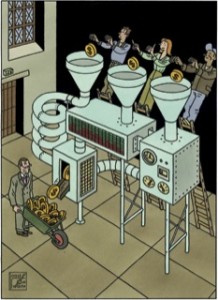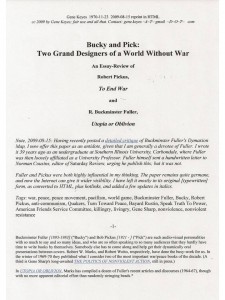As we all observe with stunning detachment the symbiotic continuance of Bush-Obama Democratic-Republican support to the Wall Street looting of America led by Goldman Sachs, whose executives continue to “own” the Department of the Treasury and the Bank of New York (Federal Reserve), I believe it helpful to itemize some legitimate grievances that could inspire State by State nullification of federal mandates and regulations, and perhaps a few secessions, with Cascadia, Vermont, Hawaii, and Alaska being well positioned to abandon a compact that no longer serves the United STATES of America, nor We the People.
I am indebted to Kirkpatrick Sale, author of Human Scale and founder of the Middlebury Institute, for teaching me about the urgency and relevance of the secessionist movements, and the detailed reflections that they have published, reflections that I point to here for the common good.
LEGITIMATE GRIEVANCES (Domestic)
The Chattanooga Declaration of 2007 (7 Points)
Core Point: Liberty can only survive if political power is returned from the banks and corporations that have corrupted the federal government, to local communities and States. The American Empire is no longer a nation or a republic, but has become a tyrant aggressive abroad and despotic at home.
The Burlington Declaration of 2006 (5 points)
Core Point: Any political entity has the right to separate itself from a larger body of which it is a part and peaceably to establish its independence as a free and legitimate state in the eyes of the world. Governments are instituted among peoples, deriving their just powers power from the consent of the governed, and whenever any form of government becomes destructive of the legitimate goals of life, liberty, prosperity, and self-determination, it is the right of the people in democratic fashion to aleter or abolish it, and to institute new government in such form as to them shall seem most likely to effect their safety and happiness.
The Logic of Secession: Three Tines to a Trident (A Manifesto by Kirkpatrick Sale)
Core Point: In the face of a rigged game in which two parties have conspired to corrupt, manipulate, and generally monopolize power, third party politics will not work. Only secession will allow for the emergence of a restored Republic once the federal government and its two-party tyranny are made irrelevant (and starved of revenue).
In Defense of Vermont's Secession from the Union (A Manifesto by Keith Brunner)
Core Point: Vermont was its own country before it joined the Union, and nothing in the Constitution of the United STATES of America precludes secession from this voluntary compact [Lincoln violated the Constitution in multiple ways, most Americans simply have not learned the truth of the matter]. The American Empire is economically, politically, cultural, and especially environmentally unsustainable, and far from fixing itself, is just getting worse. When a government of people who have no moral authority are in the possession of enough nuclear weapons to destroy the world many times over, in the position to dominate the global economy for their own interests, and continually and foolishly pace the needs of the “economic system” above the needs of the natural world, the time for action cannot be put off any longer.
LEGITIMATE GRIEVANCES (Anti-Americanism)
In sound support of the above, I have itemized a list of the behaviors and conditions that have inspired anti-Americanism. Each is, without exception, a betrayal of the public trust and grounds for abolishing the present political criminal enterprise that has hijacked the federal government and the public treasury on behalf of its banking and corporate masters. Each of these high crimes and misdemeanors justifying impeachment is derived from one or more works on non-fiction.
- A harvest of lies and a complete lack of intelligence
- Always, without exception, failure to invest in peace in the aftermath of war
- Axis of Evil #1: poverty, disease, and ignorance
- Axis of Evil #2: US support for 42 of 44 dictators, idiocy on the other two (Cuba, North Korea)
- Continue reading “Reference: Legitimate Grievances by Robert Steele”





